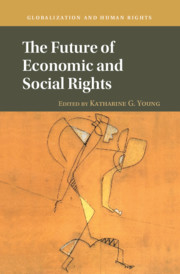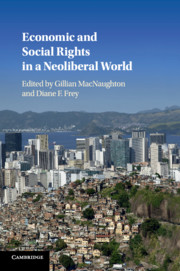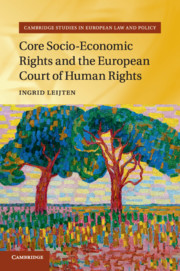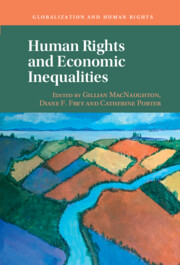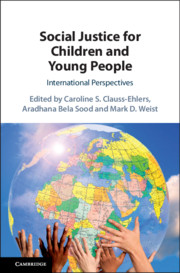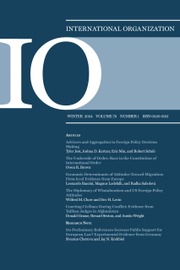The Future of Economic and Social Rights
Part of Globalization and Human Rights
- Editor: Katharine G. Young, Boston College, Massachusetts
- Date Published: April 2019
- availability: Available
- format: Hardback
- isbn: 9781108418133
Hardback
Other available formats:
eBook
Looking for an inspection copy?
This title is not currently available for inspection. However, if you are interested in the title for your course we can consider offering an inspection copy. To register your interest please contact [email protected] providing details of the course you are teaching.
-
The future of economic and social rights is unlikely to resemble its past. Neglected within the human rights movement, avoided by courts, and subsumed within a single-minded conception of development as economic growth, economic and social rights enjoyed an uncertain status in international human rights law and in the public laws of most countries. However, today, under conditions of immense poverty, insecurity, and political instability, the rights to education, health care, housing, social security, food, water, and sanitation are central components of the human rights agenda. The Future of Economic and Social Rights captures the significant transformations occurring in the theory and practice of economic and social rights, in constitutional and human rights law. Professor Katharine G. Young brings together a group of distinguished scholars from diverse disciplines to examine and advance the broad research field of economic and social rights that incorporates legal, political science, economic, philosophy and anthropology scholars.
Read more- Engages multiple disciplines
- Integrates and involves international, comparative and single-country perspectives
- Explores emerging doctrines and proposals from leading commentators on economic and social rights from international human rights and constitutional rights regimes
Reviews & endorsements
'In a fast-growing area, Katharine G. Young stays at the forefront. She is sure-footed, rigorous and empathetic.' Albie Sachs, former Justice of the Constitutional Court of South Africa
See more reviews'Methodologically pluralist and ranging widely over the world, these interdisciplinary essays [do much more than survey the existing state of knowledge about social and economic rights. They] define important lines of inquiry for future scholarship. All scholars interested in the field, whatever their discipline, will find much here to help them understand the field and move knowledge forward.' Mark Tushnet, William Nelson Cromwell Professor of Law, Harvard University, Massachusetts
'Katharine G. Young's impressive collection is an indispensable resource [for anyone working on or with economic and social rights]. Many of the leading voices in the field have contributed their recent findings and insights. Disregarding the fashionable disenchantment with human rights, these chapters analyse and firmly establish the role of rights as instruments of social justice. Spanning four continents and combining multiple scholarly methods and perspectives, this book may not literally predict the future, but it is undoubtedly able to inspire it.' Eva Brems, Universiteit Gent
'Economic and social rights are the future, whether through their realization, contributing to political stability and distributive justice, or through their denial, creating the space for individual and collective disempowerment, rising inequalities, political unrest and social conflict. The thought-provoking perspectives of the contributors to this book offer a nuanced understanding of both possibilities and of what lies in between.' Virgínia Brás Gomes, Chair of the UN Committee on Economic, Social and Cultural Rights
Customer reviews
Not yet reviewed
Be the first to review
Review was not posted due to profanity
×Product details
- Date Published: April 2019
- format: Hardback
- isbn: 9781108418133
- length: 706 pages
- dimensions: 234 x 156 x 41 mm
- weight: 1.1kg
- contains: 12 b/w illus. 6 tables
- availability: Available
Table of Contents
Foreword Amartya Sen
1. Introduction Katharine G. Young
Part I. Adjudication and Rights: Global Trends:
2. Justiciable and aspirational ESRs in national constitutions Evan Rosevear, Ran Hirschl and Courtney Jung
3. Judicial politics and social rights Malcolm Langford
4. Constitutional non-transformation? Socioeconomic rights beyond the poor David Landau and Rosalind Dixon
Part II. Adjudication and Rights in Context: Two Contrasts:
5. The Right to Education in the American State Courts Michael A. Rebell
6. Legislating human rights – experience of the right to Education Act in India Arghya Sengupta, Ajey Sangai, Shruti Ambast and Akriti Gaur
Part III. Adjudication and Rights: Democracy and Courts:
7. The participatory democratic turn in South Africa's social rights jurisprudence Sandra Liebenberg
8. Why do we care about dialogue? 'Notwithstanding clause', 'meaningful engagement' and public hearings: a sympathetic but critical analysis Roberto Gargarella
9. Empowered participatory jurisprudence: experimentation, deliberation and norms in socioeconomic rights adjudication César Rodríguez-Garavito
10. Courts and economic and social rights/ courts as economic and social rights Judith Resnik
Part IV. Economic and Social Rights in Retrenchment: Past and Future:
11. The future of social rights: social rights as capstone Jeff King
12. The present limits and future potential of European social constitutionalism Colm O'Cinneide
13. Canada's confounding experience with health rights litigation and the search for a silver lining Colleen M. Flood, Bryan Thomas and David Rodriguez
14. Universal basic income as a social rights-based antidote to growing economic insecurity Philip Alston
Part V. Economic and Social Rights in Development: Local and Global Trajectories:
15. Rights as logistics: notes on the right to food and food retail liberalization in India Amy J. Cohen and Jason Jackson
16. Human rights, investment and the rights-ification of development: the practice of 'human rights impact assessments' in large-scale foreign investments in natural resources Jeremy Perelman
17. Human rights testimony in a different pitch: speaking political power Lucie White
18. Grassroots lawfare: how South Africa's urban poor use land as a legal instrument Kerry Ryan Chance
Part VI. Rights and Accountability: Emerging Doctrines, Evolving Concepts:
19. Public budget analysis for the realization of economic, social and cultural rights: conceptual framework and practical implementation Olivier De Schutter
20. Bridging the gap: the evolving doctrine on ESCR and 'maximum available resources Rodrigo Uprimny, Sergio Chaparro and Andrés Castro Araújo
21. Waiting for rights: progressive realization and lost time Katharine G. Young.
Sorry, this resource is locked
Please register or sign in to request access. If you are having problems accessing these resources please email [email protected]
Register Sign in» Proceed
You are now leaving the Cambridge University Press website. Your eBook purchase and download will be completed by our partner www.ebooks.com. Please see the permission section of the www.ebooks.com catalogue page for details of the print & copy limits on our eBooks.
Continue ×Are you sure you want to delete your account?
This cannot be undone.
Thank you for your feedback which will help us improve our service.
If you requested a response, we will make sure to get back to you shortly.
×
